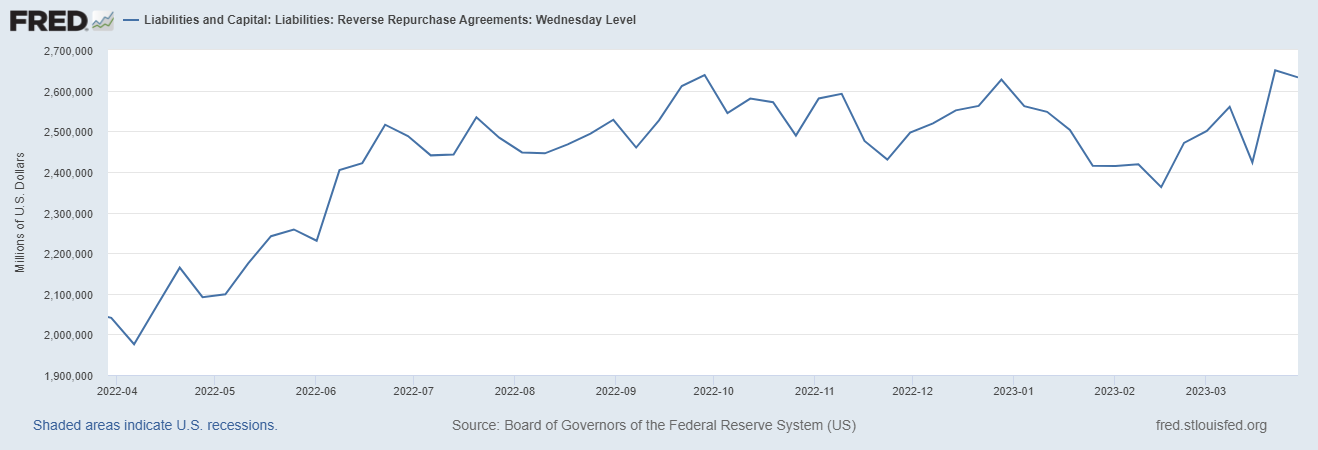If you could make more money and have close to the same amount of risk, wouldn’t you move your money to the asset that is paying more? I would. That is exactly what is happening with the banks.
The Federal Reserve has what is called a Reverse Repurchase Agreement window that is accessible to foreign official, international accounts, primary dealers and a set of eligible money market funds. The Money Market Funds are the accounts that I believe are what is causing $100’s of millions of dollars to leave bank saving and checking accounts for the better paying money market funds.
The chart below shows the increase usage since April of 2022 of the R.R.A. window by all of the entities who have access and most of all money market funds.
How does this Window work?
The Federal Reserve receives cash in a reverse repurchase agreement and provides collateral to the counterparties. That collateral could be US Treasury’s, US Treasury Bills and other approved assets. The two party’s agree on a return date and a fee is paid for the use of the assets.
Presently my bank, Regions is paying on a 13 month CD 4.16%. Savings accounts are paying 0.01% annual percentage yield (APY), where as a Fidelity Money Market Funds is paying 4.54% 7day Yield. If you had $250,000 plus most likely you would move your money from a savings account that exceeds the FDIC insured amount to a money market fund that is pay way better. Link to SPRXX Fidelity Money Market Fund .
The Fred.Stlouisfed.org website has great charts of data that most people never think about, but yet are vital to understanding the plumbing of the economic system. Click here to see the full Reverse Repurchase Agreements chart.
Why is this Important?
Banks survive off of a couple of income sources. One, banks receive deposits and then lend those deposits out at a higher rate then the amount they pay you for depositing the money in your checking or savings account. Two, they trade with that money or buy Hold to Maturity assets or All other Investable assets and make money off of the returns. The key to all of this is the deposits and the lending. Banks make sizeable spreads on the lending. The Hold to Maturity assets are there as bank reserves to meet banking guidelines. The trouble banks are having now is that their Hold to Maturity Assets are under water. Add in that depositors are seeking better yields via Money Market Funds. But the biggest problem they face hasn’t hit the headlines news just yet.
Small to mid size banks lend the majority of all commercial real estate loans. With vacancies going up and layoff escalating since last year, banks are facing a troublesome situation. A $1.4 trillion problem. Between 2023 and 2024 $1.4 trillion in commercial real estate loans will come due. Some will refinances but others may default. We are already seeing this with Blackstone’s BREIT. In the month of March this $70 billion REIT had $4.3 billion in redemption requests but only full filled $666 million of them. The same is similar for January and February. Blackstone says this is just because that their bylaws say only 5% max of the over all value of the fund can be redeemed. With all that is going on, I question if that truly is the case.
How Does all this Influence the QQQ Trade Ideas Asset Allocation?
Fact is the global economy is slowing. But more importantly the effects the slowing is having on the $85 trillion in US credit is the concern. For the US to keep on track for the target GDP growth, there needs to be an additional growth of credit of $4 trillion a year. But that is not happening. Actually the opposite is happening. Banks are tightening their lending which eventually will cause a contractions in the needed credit expansions that to maintain GDP growth. Then you include layoffs, over tightening by the Fed and other items, you have yourself a good old recession.
Flight to safety is why QQQ Trade Ideas is allocated the way it is. With the allocation to
Keep reading with a 7-day free trial
Subscribe to The Twelve to keep reading this post and get 7 days of free access to the full post archives.




